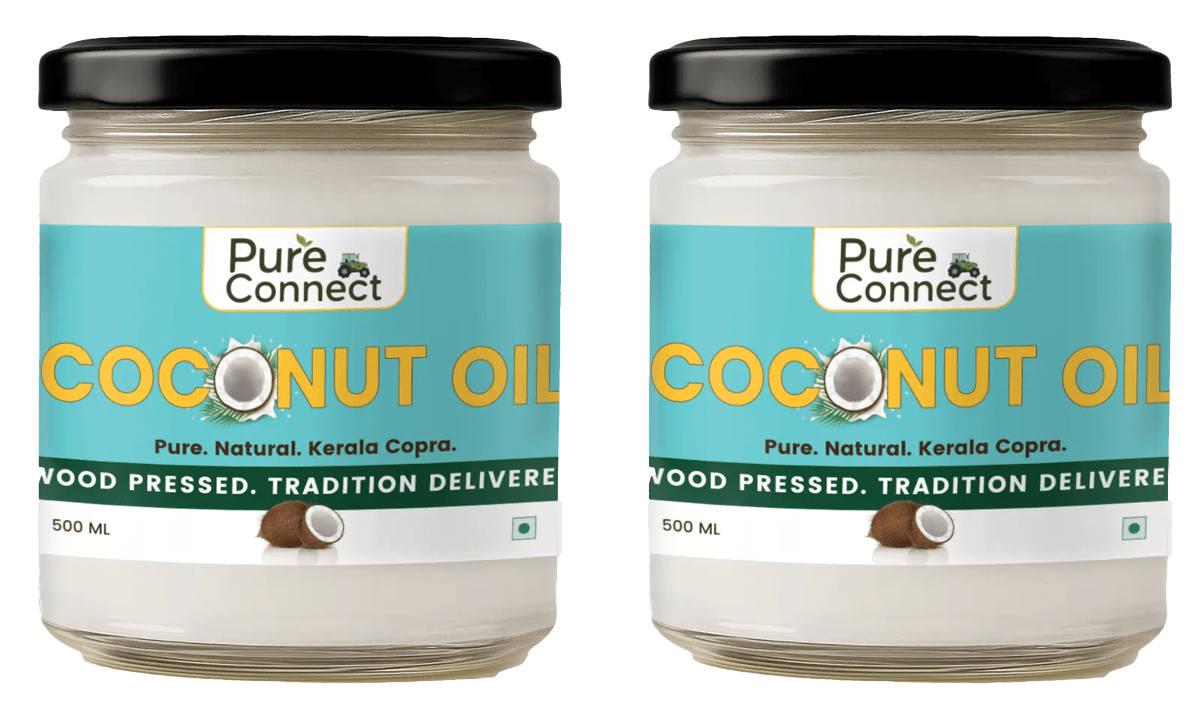
Once upon a time, coconut oil was more than just a kitchen ingredient — it was a sacred remedy. In ancient households across India, Sri Lanka, and Southeast Asia, coconut oil was pressed by hand or wooden mills, stored in earthen pots, and used to heal, nourish, and protect. Whether applied to a newborn’s delicate skin or used in temple offerings, it was revered for its purity and potency.
But times have changed.
Today, what is sold as “coconut oil” in flashy plastic bottles is often far removed from its original essence. The growing demand and profit-driven market have given birth to a darker side — adulteration.
What’s Hiding in Your Bottle?
To cut costs and increase volume, many manufacturers now mix refined palm oil or even paraffin-based mineral oil with coconut oil. These synthetic additions may not be visible to the naked eye, but their impact can be deeply harmful — especially for children.
The Silent Shift in Coconut Oil: From Purity to Profit
There was a time when coconut oil was more than just an ingredient. It was a symbol of purity, care, and wellness — a staple in every Indian household. Grandmothers swore by it for cooking, newborn massages, and even home remedies. Back then, coconut oil was made using simple, traditional methods like wooden churners or cold pressing, preserving every drop of its nutritional power.
But over the years, this tradition took a turn. With rising demand and industrialization, the market slowly drifted away from purity. Today, many coconut oils available in stores are far from what they claim to be. They may still carry the name “coconut oil”, but inside the bottle lies something else entirely.
How Adulterated Coconut Oil Is Made Today
The current method of making adulterated coconut oil is driven purely by profit — not health. To keep costs low, manufacturers often start with low-quality coconut oil or even cheap palm oil. This oil is then chemically bleached and deodorized to remove any strong or unpleasant odor. Once it’s stripped of its natural qualities, mineral oils or palm oil are blended in bulk. The final mixture is further refined to make it look appealing — clean, clear, and commercially presentable.
While it may look pure on the shelf, inside your body it behaves like a slow-acting toxin. What you’re getting is a lifeless liquid, lacking any real nourishment.
What Gets Lost in the Process
True coconut oil — especially the wood-pressed or cold-pressed kind — is naturally rich in Lauric acid, Vitamin E, antioxidants, and medium-chain fatty acids. These components are essential for building immunity, protecting skin, supporting brain development, and aiding digestion.
But during adulteration, over 60% of this nutritional value is destroyed. Most of the powerful immune-boosting compounds are lost. What remains is just a shadow of real coconut oil — a substance that clogs the system, causes irritation, and leads to inflammation rather than healing.

The Hidden Risk to Children
Children are especially vulnerable. Their bodies are still developing, and their immune systems are more fragile than adults. Applying or consuming palm oil–mixed coconut oil may lead to serious health concerns in the long run.
From skin allergies and rashes to digestion troubles and constipation, the effects are not always immediate but can accumulate over time. What’s even more worrying is the risk of hormonal imbalance caused by leftover chemical residues in the oil. These can disrupt natural growth and even delay cognitive development.
As parents, we go to great lengths — choosing organic clothing, toxin-free toys, and clean water. But what about the oil we massage into their skin or use in their food?
The Return to Roots: Why Wood-Pressed Coconut Oil Matters
Wood-pressed (also called chekku or cold-pressed) coconut oil is made using age-old, trusted methods. It involves drying the coconut, grating it, and slowly crushing it using a wooden churn without any added heat. No chemicals, no additives, no shortcuts.
This method ensures the oil retains its full nutritional integrity. The Lauric acid, famous for its antiviral and antibacterial properties, stays intact. So does the Vitamin E that nourishes the skin and supports brain health. It even preserves the natural aroma and flavor — something chemically processed oils completely lose.
Wood-pressed coconut oil is safe not just for adults, but for babies, children, and even pets. It works inside and out — whether you apply it or cook with it, the benefits are real and immediate.
Why Every Household Needs to Switch Back
This isn’t just about taste or tradition. It’s about health, safety, and trust. Adulterated oil may be cheaper today, but the medical bills of tomorrow are costlier. And when it comes to our children, nothing should come before their well-being.
Let’s return to what our ancestors knew — nature always knows best.
A Message from PureConnect: Health Is a Form of Love
At PureConnect, we believe health is not just a choice — it’s an expression of love. For your family, for your children, and for your own body. When you choose wood-pressed coconut oil, you’re not just choosing tradition — you’re choosing truth, integrity, and nourishment.
If you truly love your health, return to the roots. Return to real, wood-pressed coconut oil. The kind your grandmother once trusted. The kind your body still remembers.
Let’s not settle for what looks pure — let’s insist on what truly is.

